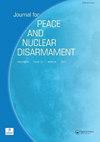The Nuclear Deterrence Strategy of the US-Japan Alliance is Failing but Can Be Fixed
IF 1.4
Q4 INTERNATIONAL RELATIONS
引用次数: 0
Abstract
ABSTRACT The current nuclear deterrence strategy of the US-Japan alliance, which is based on the threat to use nuclear weapons first in a conflict with China, is not credible and is counterproductive. A new strategy, based on diplomacy rather than threats, is needed. Unfortunately, time is no longer on the side of the alliance. China has been waiting for the United States to advance two critical international nuclear arms control agreements for twenty-five years. Chinese diplomats say they are still willing to ratify the Comprehensive Test Ban Treaty and negotiate a Fissile Material Cut-off Treaty. But the Chinese military seems to be pursuing an expansion of Chinese nuclear forces that will be difficult stop if it gets much farther along. Since a likely motivation for this expansion is to convince the US-Japan alliance that its current deterrence strategy can never succeed, reviving nuclear arms control diplomacy is the only viable means to reduce the risk of Chinese nuclear attacks against Japan.美日同盟的核威慑战略正在失败,但可以修复
美日同盟目前的核威慑战略是建立在与中国发生冲突时威胁首先使用核武器的基础上的,这是不可信的,而且适得其反。我们需要一种基于外交而非威胁的新战略。不幸的是,时间不再站在联盟一边。25年来,中国一直在等待美国推进两项重要的国际核军备控制协议。中国外交官表示,他们仍然愿意批准《全面禁止核试验条约》,并就《禁止生产裂变材料条约》进行谈判。但中国军方似乎正在寻求扩大中国的核力量,如果它走得更远,将很难阻止。由于这种扩张的动机可能是让美日同盟相信,其当前的威慑战略永远不会成功,因此恢复核军备控制外交是降低中国对日本发动核攻击风险的唯一可行手段。
本文章由计算机程序翻译,如有差异,请以英文原文为准。
求助全文
约1分钟内获得全文
求助全文
来源期刊

Journal for Peace and Nuclear Disarmament
INTERNATIONAL RELATIONS-
CiteScore
1.30
自引率
0.00%
发文量
36
审稿时长
12 weeks
 求助内容:
求助内容: 应助结果提醒方式:
应助结果提醒方式:


